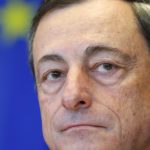ECB monetary policy meeting: 4 key points to take into account
Ready, steady, go! The new year begins for the European Central Bank (ECB).

Next Thursday (December, 21) at 1:45pm CET, the institution will announce its decision regarding interest rates,amid the volatility affecting international markets
And at 2.30pm, Mario Draghi starts the second half of his tenure as ECB Chairman with his first press conference of 2016.
While no significant announcements are expected this time, according to BBVA Research there are 4 key factors to keep an eye on:
At its 21 January meeting, we expect no change to the ECB’s monetary policy stance after last month actions

1. On hold, for the time being...
At its 21 January meeting, we expect no change to the ECB’s monetary policy stance after last month actions. At its last monetary policy meeting, the ECB took a series of measures (cutting the deposit rate to an all-time low -0.3% and extending the APP programme through the end of March 2017, at least, among others) to secure a return of inflation rates towards the central bank’s target level. From the ECB itself, Vice President Vítor Constancio announced that “it is too early to speculate on additional measures,” although he reminded that the institution’s decisions “depend” on the economic data and inflation target, in a recent interview with German daily publication ‘Börsen Zeitung'.
Dovish communication remains a key tool for the ECB

Mario Draghi, President of the European Central Bank
2. ... but strengthening its dovish communication and committing to further stimulus if needed
In its commitment to pursue an accommodative monetary policy over a long period of time, dovish communication remains a key tool for the ECB. The ECB will reiterate its commitment to the full implementation of its measures and its readiness to do more, if needed. On December 4th, 2015, during his speech at the Economic Club of New York, Mario Draghi stated that “there is no doubt that, if we had to intensify the use of our tools to reach our target of price stability, we will do it”. Moreover, Peter Praet, member of the ECB’s Executive Board said, in recent interview with Belgian publication ‘La Libre Belgique’ that (the ECB) "will pursue an accommodative monetary policy for as long as is necessary. Without giving a date, this timescale is fairly long,"
The impact of external factors and heightened uncertainty raise the possibility that current measures might not be enough

3. Watching external factors and heightened uncertainty.
Over the last two weeks, the combination of renewed turbulences in financial markets triggered once again by China, and the sharp correction in commodity prices poses further challenges for the ECB. The central bank could consider that the impact of external factors and heightened uncertainty raise the possibility that current measures might not be enough to achieve its objective in terms of inflation rates.
Markets are not pricing in immediate actions from the ECB

4. Muted impact in financial markets
Unlike what happened in December where expectations where so high, we do not expect the ECB´s monetary policy meeting to have a major impact on financial markets. Despite the deterioration of global financial conditions, markets are not pricing in immediate actions from the ECB.